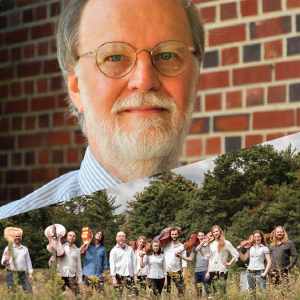2025 AMS Award Recipients
The American Musicological Society is pleased to announce the recipients of the American Musicological Society’s 2025 awards and prizes. We congratulate the recipients and thank them for their extraordinary work!
Alfred Einstein Award
Antonio Chemotti
“‘A Sweet but Grave and Sad Melody’: Music and Emotion in Exequies in Post-Tridentine Italy”
Renaissance Quarterly 77 (2024)
“. . .In this article, Chemotti conducts a systematic lexical analysis of valuable but hitherto underexamined historical sources, such as funeral books and funeral orations, in order to shed new light on the relations between music and the emotions in Italy between about 1560 and 1660. In so doing, Chemotti not only articulates the deep ambivalence that surrounded death and its rituals at this time and place, but also gives voice to a kind of listener—a nonspecialist attendee—whose experiences and expectations have not been widely represented in the musicological scholarship devoted to this period and repertoire. The article stands out for its clear and methodical argumentation, meticulous documentation, and elegant, accessible prose.”

AMS Teaching Award
Gavin S. K. Lee
“Global Music History Course Design: A Pedagogical Toolbox with Syllabi” edited by Gavin S. K. Lee, Journal of Music History Pedagogy 14:1 (2024)
“…With this second special issue devoted to ‘Global Music History,’ the Journal of Music History Pedagogy responds to a widely felt need for practical resources to help teachers decolonize their courses. Guest editor Gavin S. K. Lee assuages any worry that teaching the global might require an encyclopedic knowledge of world traditions, advocating instead for a shift of perspective and providing a rigorous examination of both the ‘promises’ and ‘pitfalls’ of global music history in an insightful, field-defining introduction. Strong theoretical foundation underpins extensive pedagogical materials in each of the ensuing chapters—by Lee, Takao, Schofield, Bloechl, and Silpayamanant—which span six continents with detailed syllabi and thematic bibliographies amounting to almost 600 entries. Rooted in a ‘restorative’ ethics that undermines Eurocentrism and promotes a polycentric model of global history, these timely articles offer concrete resources to support the global transition in music history pedagogy.”

AMS Teaching Award
Esther M. Morgan-Ellis
Navigating Stylistic Boundaries in the Music History Classroom: Crossover, Exchange, Appropriation, edited by Esther M. Morgan-Ellis (New York: Routledge, 2024).
“. . .Navigating Stylistic Boundaries in the Music History Classroom offers great pedagogical value, both for its globe-spanning content and applicability to instruction. The collection makes a compelling case for teaching intercultural ‘liminal musicking’ to help students question music’s alleged universality and recognize their own role as cultural agents. The ten chapters ‘fray the edges’ of the West and its art music (from Andalusia to China, from vernacular borrowings to musical theater); question notions of authenticity and fusion by emphasizing the historical agency of Indigenous, crossover, and diasporic musics (Indian-American, African, Mexican); and address folkloric performance practice in US colleges (Afro-Brazilian ensembles and folk bands). Besides modeling exemplary scholarship, authors provide lesson guidelines, including materials, approaches, and discussion questions. With its fascinating case studies and practical instruction plans, this collection will help teachers widen their courses to a more globally connected vista that centers the ‘negotiation of values’ across cultural and genre boundaries.”

Claude V. Palisca Award
Peter C. Muir
Early Published Blues and Proto-Blues (1850-1915). Edited by Peter C Muir, MUSA series (A-R Editions, 2024)
“. . .Early Published Blues and Proto-Blues (1850–1915) merits the 2025 Claude V. Palisca Award for its originality, interpretive depth, and compelling presentation. This groundbreaking edition assembles a substantial and previously overlooked corpus of early published blues and proto-blues songs. Through detailed commentary, evocative cover images, and rare manuscript reproductions, it captures the pivotal moment when an orally transmitted tradition began to be commercialized, offering a powerful window into both musical and socio-historical dynamics. The edition makes a compelling case for rethinking the origins and scope of blues as a genre in its formative stages, while illuminating the astonishing geographic spread of its early publishing—a metaphor for the broader dissemination of blues culture. The introductory essay is especially distinguished—not only does it contextualize the repertoire within the broader musical and cultural landscape, but it also challenges entrenched narratives surrounding the blues, destabilizing reductive assumptions and offering a more expansive view of the genre’s early development and dissemination. Elegantly presented and expertly executed, the edition exemplifies the highest standards of scholarly editing. It is not merely an anthology; it is a scholarly intervention that invites us to rethink the boundaries of blues history and the canonization of musical traditions. This edition brings much-needed attention to a repertoire of both musical and socio-historical significance, and it promises significant pedagogical and cultural impact. By bringing a largely ‘lost’ repertoire into view, this edition offers a timely and vital contribution to musicology as a discipline.”

Early Music Award
Michael R. Dodds
From Modes to Keys in Early Modern Music Theory (Oxford University Press, 2024)
“. . .Michael Dodds’s From Modes to Keys makes a landmark contribution to the study of Early Music by rethinking one of its most enduring problems: the transition from modality to tonality. Rather than repeating the familiar narrative of abrupt change, Dodds maps the complex, overlapping processes through which old ideas were reworked, adapted, and transformed. Drawing on four decades of scholarship, he traces developments from medieval tonaries to the Well-Tempered Clavier, revealing the interplay between theory, pedagogy, and practice, and between monophonic, polyphonic, and keyboard traditions. With clarity and authority, Dodds illuminates not only the ‘what’ of modal and tonal systems but also the ‘how’ and ‘why,’ showing how generations of musicians sought to classify melodic practice through scales, ladders, cycles, and circles. Bold in scope and nuanced in detail, this book establishes a new standard for understanding Early Music and the tonal systems that grew from it.”

H. Colin Slim Award
Julia Doe
“Musical Sociability, Atlantic Slavery, and the Portraiture of Carmontelle” Journal of Musicology 41:1 (2024)
“. . . This article draws on a wide range of archival and secondary sources to explore the harpsichord as a site of imperial encounter in pre-revolutionary France. The article closely examines a drawing by the artist Carmontelle, in which an aristocratic woman plays the instrument in the company of an elegantly dressed, attentive Black servant—both of them originally from the colonial territory of Saint-Domingue. It highlights the transatlantic entanglements that percolated through France’s metropolitan culture of elite sociability, and which find traces in the drawing. Doe’s analysis—informed by scholarship in social history, postcolonial studies, and art-historical scholarship—challenges prevalent assumptions about the agency of galant French aristocrats and of their servants in the context of colonial France. It makes an outstanding contribution to the growing literature, in musicology and elsewhere, that recenters the experiences of African and African-descended people in early modern France.”

H. Robert Cohen/ RIPM Award
Kevin Bartig
“Olin Downes and the Soviets” Journal of the American Musicological Society 77:3 (2024)
“. . .The H. Robert Cohen/RIPM Award recognizes an outstanding scholarly publication based on the musical press. This year’s Award committee, consisting of Simon Morrison, Hilary Poriss, and John A. Rice, have decided that the Award should go to an article that shows how a leading American music critic of the first half of the twentieth century reported on and interpreted Soviet musical culture for American readers. Demonstrating a firm command of periodical and archival sources, the author reveals a rich history of cultural dialogue and exchange between the United States and the Soviet Union during the 1930s that was subsequently erased by McCarthyism. The 2025 Cohen/RIPM Award goes to Kevin Bartig’s article ‘Olin Downes and the Soviets,’ published last year in the Journal of the American Musicological Society.”

Judy Tsou Critical Race Studies Award
Masi Asare
Blues Mamas and Broadway Belters: Black Women, Voice, and the Musical Stage (Duke University Press, 2024)
“. . .The committee felt that this work bridged an important gap between the study and practice of musical theater, while recentering Black women and their contributions within this history. The lineages of Black female genius outlined in Asare’s text represent far more than just a recovery narrative; they force us to reconsider a genre and industry that have been foundational in the development of the American musical landscape. Intensely interdisciplinary in nature, Asare takes up where earlier scholarship leaves off, providing a powerful framework for analyzing—and understanding—the connections between voice, gender, race and genre.”

Lewis Lockwood Award
Jamie Reuland
Music and the Making of Medieval Venice (Cambridge University Press, 2024)
“. . . How do the agents and institutions of an empire use music to exert state power? Jamie Reuland explores this question in Music and the Making of Medieval Venice, using a panoply of methods and an audacious range of sources. The intensive research of the book shows the many ways musical genres, performances, and iconography worked hand-in-hand with civic, legal, and religious institutions that were vital to the creation and extension of the early Venetian empire. Music and the Making of Medieval Venice offers new ways for musicologists to think about representation and politics, showcases creative ways to uncover the history and meaning of the musical past, and models an approach to scholarly work that is inviting and engaging.”

Music in American Culture Award
Emily Bingham
My Old Kentucky Home: The Astonishing Life and Reckoning of an Iconic American Song (University Press of Kentucky, 2024)
“. . .In My Old Kentucky Home: The Astonishing Life and Reckoning of an Iconic American Song, Emily Bingham takes the concept of a song biography and puts it to innovative use. Not only does Bingham follow the song’s performers and audiences from the mid-nineteenth century to the present, she draws deeply on her own biography and family history. This is an unflinching look into the institutions and effects of slavery and anti-Black racism in the U.S. and a book that goes beyond the trope of music as reflecting these aspects of our culture, showing us how one song helped define and reinforce them over generations. The reckoning in Bingham’s work is the product not only of a thorough knowledge of the scholarship on minstrelsy and Stephen Foster, but also brilliant archival work at the local level.”

Music in American Culture Award
John Minton
Folk Music and Song in the WPA Ex-Slave Narratives (University Press of Mississippi, 2024)
“. . .The committee recognizes John Minton’s Folk Music and Song in the WPA Ex-Slave Narratives as an outstanding compendium of knowledge and a timely, major contribution to ethnomusicology. This book brings forward the voices of formerly enslaved people in a way that not only preserves history but also reshapes how we understand the cultural and musical practices at the heart of African American traditions. Unlike earlier treatments of the WPA archive, this edition is curated with a fresh perspective, leaving space for the voices of the past to speak more directly, with less authorial intervention. We especially value the richness of its primary source documents, which provide unparalleled access to oral histories that continue to shape the study of American music.”

Otto Kinkeldey Award
Katherine Butler Schofield
Music and Musicians in Late Mughal India: Histories of the Ephemeral, 1748–1858 (Cambridge University Press, 2024)
“This year’s Otto Kinkeldey award goes to Katherine Butler Schofield for her book, Music and Musicians in Late Mughal India: Histories of the Ephemeral, 1748-1858. Based on exhaustive archival research and demonstrating the author’s astonishing linguistic and historical expertise, the book tells the little known stories of nine Hindustani musicians in the fraught years of late Mughal India. Staged between a waning musical culture of classical court music and the dislocations of an encroaching British rule only slowly coming into view, a series of poignant stories unfold telling of court intrigues, musical rivalries, and colonial usurpation. But there are also heartening stories of heroic efforts by Hindustani musicians to remember, record, and memorialize the history of their musical legacy, to codify and theorize their musical practice reconceived for a new era. Above all, it is a chronicle of the circumlocutions by which North Indian classical music coalesced into its modern form.”

Philip Brett Award
Gavin S. K. Lee
“Hermeneutic Limits; or, When Not to Theorize: Notes for Interpreting Our Phoenix by Trans Indigenous Mexican-American Composer Mari Esabel Valverde,” Music Theory Spectrum 46:2 (Fall 2004)
“. . .In a moment when trans and queer of color musicians, and even music scholars, are facing increasing precarity and violence, Gavin S. K. Lee’s ‘Hermeneutic Limits; or, When Not to Theorize’ draws us into a vital conversation around music studies as a form of community care. Lee incisively explores the limits of using queer analytical frameworks to study trans music and trans artists’ material lives, proposing an ‘inclusive neopositivism’ that counterbalances the sometimes essentializing attention to anti-normativity among marginalized gendered and racialized music and performance. Lee’s adept analysis of Mari Esabel Valverde’s contemporary choral works offers critical tools for the rapidly growing areas of trans musicology and trans music theory, in addition to timely perspectives on how musicology might navigate ethics and inclusion.”

Robert M. Stevenson Award
Benjamin Barson
Brassroots Democracy: Maroon Ecologies and the Jazz Commons (Wesleyan University Press, 2024)
“. . .Brassroots Democracy: Maroon Ecologies and the Jazz Commons is an original book that grabs the reader’s attention from the very beginning to unfold a fascinating story of the birth of jazz intertwined with the radical emancipatory revolution in Haiti and its cultural and political impact on 19th-century Louisiana. In this context, the fusion of brass band participatory performance with civil rights campaigns drew on the rhythmic substrates of the Cuban-Haitian tresillo and habanera, which were already popularized by Mexican military bands in Louisiana, resulting in a reinterpretation of brass band rhythm that developed powerful solidarity networks. It is an innovative transnational narrative of Afro-Caribbean social and musical influence, aptly revealing the agency of black artists and activists that challenged anti-black violence in the Reconstruction era and beyond. Far from an apolitical art form, early jazz emerges here as a sonic commons where joy, solidarity, and resistance converged, laying the groundwork for both a new music and a new vision of freedom. Brassroots Democracy continues to resonate to the present.”

Roland Jackson Award
Gurminder Kaur Bhogal
“Tracking the Harmonium from Christian Missionary Hymns to Sikh Kirtan” Yale Journal of Music and Religion 8:2 (2022)
“This year’s Roland Jackson Award goes to Gurminder Kaur Bhogal for ‘Tracking the Harmonium from Christian Missionary Hymns to Sikh Kirtan,’ in the Yale Journal of Music and Religion 8:2 (2022). The harmonium was introduced in Punjab by Western missionaries over a century ago and became embedded in Sikh devotional music, kirtan. In 2022, Sikh leadership banned harmonium in the holiest temple, to decolonize kirtan and return to traditional instruments. Tracking the harmonium in kirtan history and practice, Bhogal uses music analysis to compare its capabilities with those of traditional instruments. Her archival, ethnographic, and music-analytic inquiry sheds new light on an instrument ubiquitous in South Asian religious cultures and played by millions across the globe. She expands the field’s understanding of devotional sound practices, illustrates linkages between instrument and identity, and amplifies marginalized voices, particularly of women musicians. Bhogal’s lucid, learned work highlights the complexities of a trauma-linked colonial “cultural remnant” whose abolishment would engender further trauma.”

Ruth A. Solie Award
Linda Zionkowski and Miriam F. Hart
Women and Music in the Age of Austen (Bucknell University Press, 2024)
“. . .Women and Music in the Age of Austen, edited by Linda Zionkowski and Miriam F. Hart, is awarded the Ruth A. Solie Award for a collection of musicological essays of exceptional merit. This volume brings an entirely novel approach to a seemingly well-worn topic, taking seriously how women’s participation mattered to music and culture in Austen’s era. Generous and inviting in both spirit and form, the book assembles scholars across disciplines—remarkably, half from literary studies—and across career stages, creating a chorus of voices that expands rather than narrows the frame. Its essays are grounded in the fascinating specifics of Austen’s time and oeuvre while opening a window onto broader cultural questions, revealing how women acted as performers, patrons, critics, composers, musical businesswomen, and other curators of musical life. The result is a collection of unusual range and freshness, one that models how cross-disciplinary collaboration can reshape the landscape of musicological inquiry.”

Ruth A. Solie Award (Honorable Mention)
Peter McMurray and Priyasha Mukhopadhyay
Acoustics of Empire: Sound, Media, and Power in the Long Nineteenth Century, edited by Peter McMurray and Priyasha Mukhopadhyay (Oxford University Press, 2024)
“. . .The Acoustics of Empire: Sound, Media, and Power in the Long Nineteenth Century, edited by Peter McMurray and Priyasha Mukhopadhyay, demonstrates capacious yet focused editorial command, drawing together a wide range of voices to situate sound at the center of imperial modernity. Its global reach and historical specificity combine to show how acoustics and empire co-constituted one another, while its critical framing and methods push sound studies in daring new directions. By decentering Euro-American paradigms and foregrounding overlooked archives and epistemologies, the collection expands the horizons of our field.”

Related News


